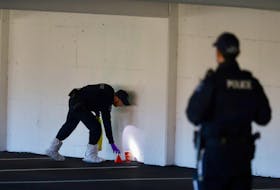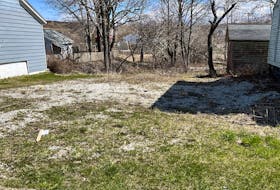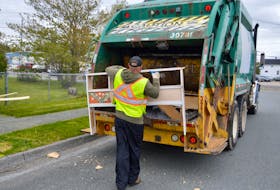AMHERST, N.S. — It didn’t take long for Const. Victor Manuel to pull over his first motorist early Monday.
The member of RCMP Northwest Traffic Services Amherst had barely entered Highway 104 in Amherst when he pulled up behind another RCMP cruiser that had stopped a speeder, only to have a vehicle blow by both at more than 120 km/h.
It’s a telling reality. Nearly a decade after Nova Scotia adopted ‘move over’ legislation to protect emergency personnel working on the province’s roadsides, and two years following the death of RCMP officer Const. Frank Deschenes in Memramcook, N.B., motorists are still not moving over and slowing down.
Members of RCMP Northwest Traffic Services Amherst participated in an awareness exercise along Highway 104 between the border with New Brunswick and Thomson Station on Monday, ticketing several drivers for failing to move into the passing lane and slow down to 60 km/h when passing an emergency vehicle with its lights engaged.
During the morning there were 21 move over charges and eight charges for other offences. Four warnings were also issued.
Despite this, officers are seeing a difference.
“Things are changing for the positive,” Const. Bryce Haight said. “Personally, I’m feeling safer out there on the highways, but we still have a long way to go. People need to learn to get over and to slow down because we all have families we want to go home to.”
Sept. 12 marks the second anniversary since Deschenes was killed near Memramcook, N.B. when he was struck on the side of the road after stopping to help a motorist change a tire.
His death sent shockwaves through the law enforcement community and led to a call to place signage near the exits of the 100-series highways to remind motorists that it’s the law to move over and slow down when they come upon emergency vehicles with their lights engaged.
Even on Monday, as RCMP had vehicles stopped for speeding or failing to slow down and move over, several motorists continued to pass close the cruisers with the wind of the passing vehicles shaking the cruisers as they passed.
Working in a buddy system, an officer who stopped a vehicle had another that would pursue and stop those vehicles that didn’t move over and slow. During a two-hour period, more than 90 per cent of the vehicles did move over, but few dropped their speed to 60 km/h.
Manual’s first stop resulted in a ticket. The fine is steep. The first offence comes with a fine of more than $350.
In two other instances, three successive vehicles failed to move into the passing lane. They were stopped and ticketed.
“This week is very important to us because what of happened two years ago to our colleague. It is still very fresh in our minds every time we step out of our vehicle on the side of the highway,” Haight said. “Every police officer and emergency provider needs to feel safe on the roadside. This is our workplace and the law is in place to protect us and others.”
Haight said the education component is reducing the numbers of incidents, he said. Transport drivers, he said, have been quick to catch on and are leading the way. Other motorists have some catching up to do, but they are getting there.
“People who get caught are telling two friends and they’re telling their friends that we’re serious about this,” Haight said. “I think the media has had a role to play as well in helping us get the message out. I am seeing a difference.”
He did notice motorists were slowing down, but quite a few weren’t. That’s the biggest issue to him and other officers – motorists are still not slowing down even if they are moving over. Haight said more education is needed before motorists realize it’s a two-part law in that they need to move over, if safe to do so, and that they have to reduce their vehicle’s speed to 60 km/h.
Manuel said he too has seen a difference, but it’s something police are going to have to continue enforcing. Manuel said most of the people he stopped on Monday morning were apologetic and understand why they received a ticket.
“They understood,” he said. “In some cases, they said they forgot to slow down. It’s something we’re going to have to keep working on. At the end of the day, I really want to go home to my family and it’s nice to not have to worry about my safety or the safety of others when I get out of my vehicle.”
Manuel said police are going to continue focused enforcement on the 100-series highways in Nova Scotia until motorists get it. Eventually, he hopes, it will become an automatic reaction for motorists to move over and slow down, not just for stopped police vehicles but for fire vehicles and ambulances.
There is also a push to have tow trucks added to the list of vehicles.
“We have to take care of each other out on the highway,” Manuel said.








